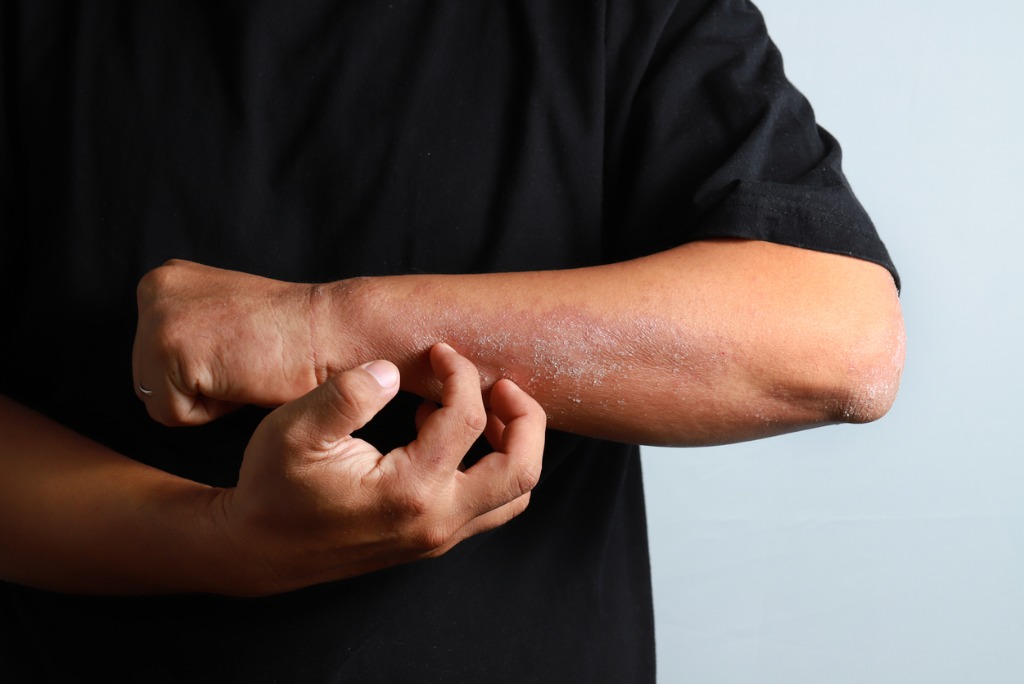Atopic dermatitis is a form of eczema and is the most common chronic inflammatory skin disease. While this condition is often seen in children, around 16.5 million Americans suffer from this itchy skin condition. Although there is no cure for this condition, with the proper knowledge, treatments, and lifestyle changes, those with eczema may manage their symptoms and lead happy, healthy lives.
What Does Atopic Dermatitis Feel and Look Like?
The symptoms of atopic dermatitis typically come and go in cycles. They may be worse for a few weeks or months and then improve or even clear up entirely for a while. The symptoms may also be different from person to person and may range from mild to severe.
Common symptoms include:
- Dry skin
- Itching
- Redness of the skin
- Scaling or flaking skin
- Cracking and bleeding of the skin
- Rashes
- Raw skin from scratching
- Dark-colored patches
By familiarizing yourself with the signs and symptoms of atopic dermatitis, you may be better equipped to manage the condition and determine the severity of your flare-ups. If you are experiencing any of the above symptoms, it is important to consult with your doctor or dermatologist for an accurate diagnosis.
What Causes Atopic Dermatitis?
This condition occurs when a gene variation causes the skin to become dry and irritated. This impacts the skin’s ability to protect against irritants, bacteria, and allergens. When the skin is exposed to these irritants, it becomes inflamed and leads to the symptoms of atopic dermatitis.
There are a number of risk factors that may increase your chances of developing the condition, including:
- A family history of eczema, hay fever, or asthma
- Exposure to irritants, such as chemicals, soaps, and detergents
- Excessive sweating
- Changes in temperature
- Food allergies
- Stress
The primary risk factor for atopic dermatitis is having a family member with the condition. If you have a parent or sibling with eczema, your risk of developing the condition is increased.
Ways to Treat and Prevent Flare-ups
Unfortunately, there is not yet a cure for this condition. However, there are several ways to manage the symptoms and prevent flare-ups.
Moisturize Your Skin
Keeping your skin moisturized is one of the most important things you can do to manage your eczema. Choosing lotions without fragrances, dyes, or other irritants will help to soothe your skin and prevent further irritation. In addition, it is important to apply moisturizer immediately after bathing while your skin is still damp.
Try moisturizing your skin with:
- Cold-pressed coconut oil
- Sunflower oil
- Shea butter
- Aloe vera
While moisturizing your skin may help reduce your symptoms, over-moisturizing your skin may make the condition worse. Be sure to follow the directions on your moisturizer and only apply it as often as directed.
Avoid Triggers
Identifying and avoiding your triggers is an integral part of managing atopic dermatitis flare-ups. Each person’s triggers are different, so it is essential to pay attention to your body and what causes your symptoms to worsen.
Common triggers for this condition include:
- Exposure to irritants, such as chemicals, soaps, and detergents
- Excessive sweating
- Allergen exposure, such as pollen, dust mites, and animal dander
- Food allergies
- Changes in temperature
- Certain fabrics and materials, such as wool and polyester
- Stress
If you can identify your triggers, you can take steps to avoid them and reduce the frequency and severity of your flare-ups. Avoiding triggers may not be possible in all cases, but it may help reduce the impact of atopic dermatitis on your life.
Use Gentle Soaps
Soaps with harsh chemicals and detergents may trigger flare-ups. Choosing a gentle, fragrance-free soap may reduce irritation and keep your skin healthy. Oatmeal-based soaps are a good option for people with eczema. When choosing a soap, read the label and avoid any antibacterial or deodorant soaps that contain irritants, such as fragrances, dyes, or other harsh chemicals.
Avoid Itching
One of the most common symptoms of atopic dermatitis is itching. Itching can range from mild to severe. Scratching your skin will only make the itching worse and may lead to infection.
If you feel the urge to itch, try to distract yourself or take a cool shower. Applying a cold compress to the affected area may also reduce itching. If itching is severe, you may need a stronger treatment option. Talk to your doctor about prescription medications that may help relieve itching and inflammation.
Take Short, Warm Baths
Long, hot baths may actually make your symptoms worse. Instead, take short, warm baths and add a small amount of colloidal oatmeal, which may help to soothe your skin. After bathing, be sure to apply a moisturizer while your skin is still damp.
Be sure to dry your skin gently. When you have eczema, it is crucial to avoid excessive rubbing and scrubbing, which may further irritate your skin. Instead, gently pat your skin dry with a soft towel.
Find a Clinical Trial for Atopic Dermatitis
Following the above tips may assist in managing your atopic dermatitis and reducing the frequency of flare-ups. However, If you are looking for additional relief, you may want to consider enrolling in a clinical trial.
Clinical research studies are vital to developing new treatments and may provide relief for those struggling to reduce their symptoms. If you are interested in enrolling in a clinical trial, Olympian Clinical Research is conducting a study on atopic dermatitis. To learn more about this study and see if you qualify, contact us today or view our complete list of studies online here.

Recent Comments